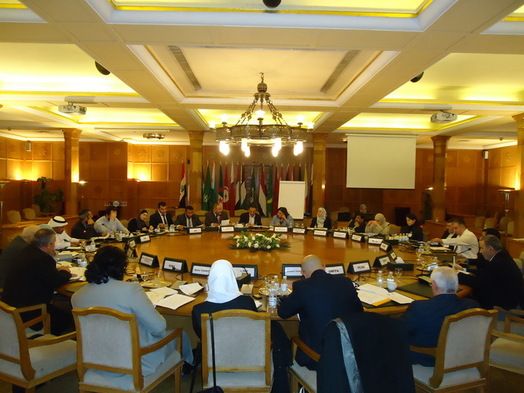
Hosted by the League of Arab States, Organization of Islamic Cooperation and The Humanitarian Forum, the meeting to coordinate aid delivery to the Syrian people was held in the Egyptian capital Cairo at the Arab League Headquarters.
The meeting was attended by representatives of Turkey’s IHH Humanitarian Relief Foundation, the UN Office for the Coordination of Humanitarian Affairs (OCHA), World Health Organization (WHO), World Food Programme (WFP), Red Crescent and Red Cross organizations, various NGOs and Syrian representatives.
Representatives of the organizer bodies and Arab League Secretary-General Nabil al-Arabi delivered speeches at the opening session. Al-Arabi summarized the efforts of the Arab League, both within the organization and on the international arena, to resolve the ongoing crisis in Syria and ensure the safety of the people.
The opening speeches were followed by presentations about the situation and needs of the affected people inside Syria and refugees in neighboring countries. İzzet Şahin, IHH International Affairs Coordinator, also made a presentation on the situation of Syrian refugees in Turkey. Large numbers of Syrian refugees sought shelter in Turkey following the outbreak of protests and despite intermittent drops in the number of new arrivals the total number has risen sharply after the crackdown on the city of Idlib, Şahin noted.
“Basic needs of refugees arriving in Turkey are met by the Red Crescent and IHH; however, the real problem is inside Syria borders. IHH is ready to deliver humanitarian assistance to the affected people in Syria through a humanitarian aid corridor.”
Şahin informed that the Syrian refugees in Hatay Province are accommodated in tent camps, city center and nearby villages and added about ten thousand refugees would be transferred late this month to container houses set up in Kilis Province.
“We are preparing to offer shelter to more Syrian refugees, but what we hope is an end to attacks that compel people flee their homes, a halt to the bloodshed and rebuilding of lives,” Şahin said, adding the foundation was only working to help civilian population independent of political agendas, which he reminded was a humanitarian duty.
A number of workshops were held about delivering relief to the Syrian people, principles of relief aid, health and food aid.
A common point about the representatives was their inability to deliver assistance inside Syria even though month-long siege and fighting in Syrian cities have deprived the people of basic necessities.
The speakers recalled that even in inter-state wars civilians are protected and aid channels are kept open, while the Syrian authorities have so far failed to grant permit to any NGO to deliver aid.
The representatives also urged UN and Arab League envoy on Syria Kofi Annan to discuss the opening of an aid corridor in his talks with the Syrian regime.
A number of recommendations were issued to decision-making bodies and international NGOs. The meeting recommended:
- Neighboring countries to facilitate the access and delivery of aid to affected people in Syria and outside. Mobile medical centers should be set up on the borders and injured victims should be treated.
- Humanitarian agencies to attend to the psychological support of conflict victims.
- Utilize all available opportunities to allow delivery of humanitarian relief.
- Cooperate with Syria-based registered, transparent NGOs for delivering aid.
- Promote collaboration between humanitarian agencies in the field and border areas.
- Assess and address the need of people for food items in Syria after a year of long disturbances and few years of drought.
- Preparedness response should be developed to meet the challenges of possible mass displacement or repatriation.
- Humanitarian stakeholders need to improve their coordination mechanisms and partnership with private sector, civil society organizations and government agencies.
- Ensure safety of humanitarian workers wherever they are stationed.
- Mobilize the role of League of Arab States and the Organization of Islamic Cooperation as leading humanitarian coordination bodies in the region